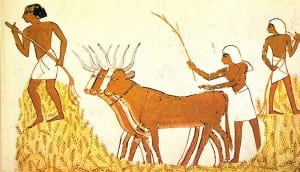Adaptation after Africa
By Freya A Boardman-Pretty, on 18 June 2012
The man outside the venue at first looked unassuming. “Let me give you a free handout,” he said. I began to reach out for the photocopied leaflet before noticing the title: Evolution – a lethal antiscience. “Do you know what antiscience is?” I had encountered a lot of different people at Cheltenham Science Festival, but not yet the evangelical campaigner.
Sadly, I didn’t have the time to get into a debate about whether his quotes from the Bible counted as evidence from a peer-reviewed publication, but the talk, Evolution out of Africa, proved to be a suitably enjoyable alternative. Mark Thomas, Angela Clow and Jonathan Rees told us about the adaptations humans migrating out of Africa picked up, and what they mean for us today.
Mark began by telling us about adaptations resulting from changes in the human diet. Advances in food culture greatly change how we work: tools for hunting, first used about two and a half million years ago, caused our diet to change from largely vegetable- to meat-based, providing us more energy for the expansion of that energetically-expensive organ, the brain.
One of the most significant dietary changes was a very recent one: the advent of farming. About 10,000 years ago humans began to cultivate crops, bringing radical changes to our diet. With small numbers of grains dominating instead of a wide variety of foraged plants, the breadth of the diet decreased, while the relative amounts of carbohydrates rocketed.
 Close
Close


